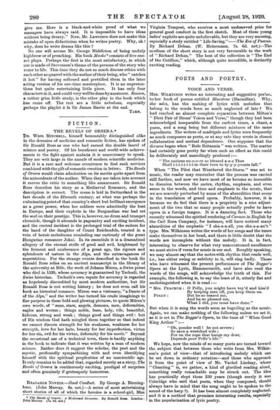FICTION.
THE REVELS OF ORSERA.*
DR. WEIR MITCHELL, himself honourably distinguished alike in the domains of medicine and romantic fiction, has spoken of Sir Ronald Ross as one who had earned the double laurel of science and poetry. Of his beneficent and world-wide achieve- ments in the fight against malaria it is unnecessary to speak. They are writ large in the annals of modem scientific medicine. But it is a rare and welcome occurrence to find such services combined with the gift of romantic creation in letters. The Revels of Orsera would claim admiration on its merits quite apart from the antecedents of the author. When they are taken into account it moves the critic to something like amazement. Sir Ronald Ross describes his story as a Mediaeval Romance, and the description is correct. The scene is laid in Switzerland in the last decade of the fifteenth century, at what was perhaps the culminating point of that country's short but brilliant emergence as a great power, when her soldiers were admittedly the best in Europe, and their exploits in the Burgundian war had set the seal on their prestige. This is, however, no drum and trumpet chronicle, though it abounds in pageantry and exciting incident, and the central incident is the prolonged trial of the suitors for the hand of the daughter of Count Reichenfels, treated in a vein of heroic melodrama reminding one curiously of the great Hungarian romancer Jokai. In its essentials it is a dramatized allegory of the eternal strife of good and evil, heightened by the ferment and exuberance of a great age, the rigours and splendours of nature in the Alps, and the extravagances of superstition. For the strange events described hi the book Sir Ronald Ross relies on an ancient manuscript in the library of the university at Bale, the work of Johann Muren, a Swiss priest who died in 1539, whose accuracy is guaranteed by Tschudi, the Swiss historian. Tschudi's own repute for accuracy is regarded as hopelessly discredited by most modern authorities, but Sir Ronald Ross is not writing history ; he does not even call his book an historical romance. Muren was a visionary, "a Dante of of the Alps," and the writer has turned his crude imaginings to fine purposo in these bold and glowing pictures, to quote Mt]ren's own words, of " suns, stars, angels, demons, men, deformities, eagles and worms ; things noble, base, holy, vile, beautiful, hideous, strong and weak ; things good and things evil : but of His wisdom God hath mingled them together so that indeed we cannot discern strength for his weakness, weakness for her strength, love for her hate, beauty for her imperfection, virtue for her sin, evil for his virtue, deformity for his merit." Beyond the occasional use of a technical term, there is hardly anything in the book to indicate that it was written by a man of modem science. Rather does it suggest the scholar, the poet and the mystic, profoundly sympathizing with and even identifying himself with the spiritual perplexities of an unscientific age. It only remains to be added that, regarded merely as a story, The Revels of Orsera is continuously exciting, prodigal of surprises and often genuinely if grotesquely humorous.


































 Previous page
Previous page